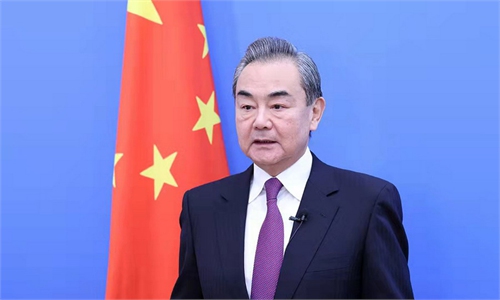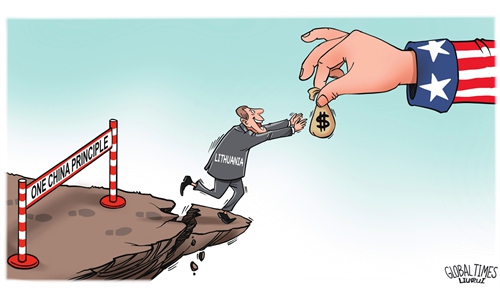Upcoming ‘economic talk’ between US, Taiwan island a betrayal of Biden’s pledges
Move serves DPP’s secessionist agenda

US, Taiwan Illustration: Xia Qing/GT
The second so-called economic prosperity partnership dialogue between the US and the island of Taiwan scheduled on Monday has met criticism from Chinese officials and observers, who slammed it as an obvious violation of US President Joe Biden's recent pledges of not encouraging "Taiwan independence" and that it again sends the wrong signals to secessionist forces on the island.A media note released by the US State Department read that the Monday meeting, billed as the second US-Taiwan Economic Prosperity Partnership Dialogue (EPPD) will be conducted under the auspices of the American Institute in Taiwan and the Taipei Economic and Cultural Representative Office in the US.
Under Secretary for Economic Growth, Energy, and the Environment Jose W. Fernandez will lead the US delegation.
This is the second round of economic talks between the two sides since the first EPPD took place in November 2020. "Our partnership is built on strong two-way trade and investment, people-to-people ties, and in common defense of freedom and shared democratic values," the US State Department claimed in the media note.
The meeting, a de facto official contact event rather than a non-government exchange between the US and the island, is an obvious betrayal of the one-China principle on Washington's part, and a clear betrayal of Biden's pledges, Yuan Zheng, deputy director of the Institute of American Studies, Chinese Academy of Social Sciences, told the Global Times on Sunday.
Also denouncing the upcoming dialogue as a violation of Biden's pledges, Liu Pengyu, spokesperson with the Chinese Embassy in Washington, called on the US government to "stop all forms of official exchanges and contacts with Taiwan, stop elevating its relationship with the Taiwan region in any substantive way, so as to avoid serious damage to China-US relations and peace and stability across the Taiwan Straits," according to media reports.
In the first round which was held in the final months of the Donald Trump administration in 2020, the two sides signed a five-year memorandum of understanding and vowed to keep forging closer economic ties.
The US is likely to continue to establish economic connections with the island of Taiwan in multiple dimensions, to serve the purpose of boosting its own economy while containing China's, Li Haidong, a professor at the Institute of International Relations of the China Foreign Affairs University, told the Global Times on Sunday.
Against the backdrop of the US-waged technology competition against China, the US might seek to sign new memorandums of understanding with the island in the areas of supply chain and 5G communication technology, Zhang Wensheng, a deputy dean of the Taiwan Research Institute at Xiamen University, told the Global Times on Sunday.
The possibility of pushing forward talks of a free trade agreement between the two sides cannot be ruled out during the meeting, Li noted.
The two sides held long-delayed talks on a Trade and Investment Framework Agreement virtually in July, and Taiwan said it hoped it would be possible to sign an FTA one day, Reuters reported.
Talks over the agreement, if any, would be considered as another act of US "playing with fire," to further anger China and harm China-US relations, observers warned.
Not surprisingly, the ruling Democratic Progressive Party authority on the island has taken advantage of such event to sell its secessionist agenda.
Joseph Wu, head of the island's external affairs department, called the dialogue an "important milestone" and "the highest level regular economic dialogue between the US and Taiwan."
Tsai Ing-wen tweeted on Saturday that the upcoming dialogue "marks another step toward closer #Taiwan-#US economic & commercial ties," in an interacting post with Fernandez.
Tsai is exploiting the ambiguity in such remarks to serve her ultimate goal of pulling Taiwan away from the Chinese mainland and damaging the internal and external environment for the mainland's development, and the Biden administration is aiding her toward such a goal, Li criticized.




